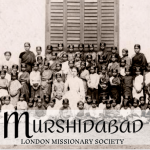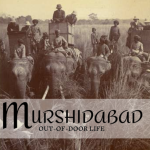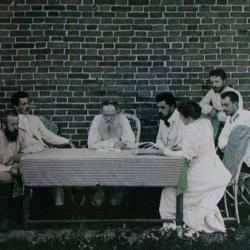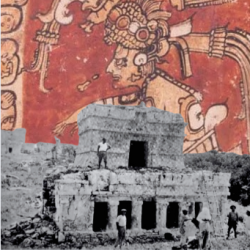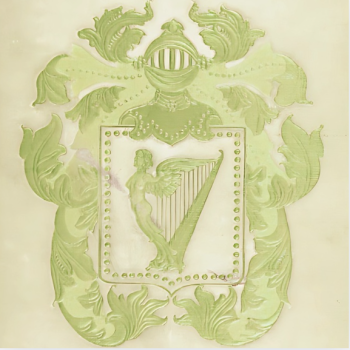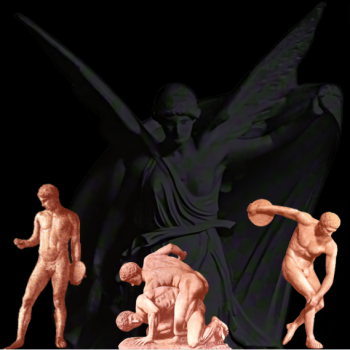OKHOY BABU
Charles Johnston.
Late October 1889.
“Your Honor!” Okhoy Babu interrupted, with that oily smile of his, “I request an adjournment of the court, if your Honor pleases! I have just heard of important new evidence in this case!”
Indranath Babu, my chief clerk, began to frown and cluck with his tongue. He was long-nosed and very dark, with a face like a wise bird; a fine fellow for all his ugliness, and to be trusted. He had that trick of clucking, like an offended wren, when things were going awry, and I had learned to watch for it.
So Indranath Babu clucked and frowned, and Okhoy Babu stood expectant, with his fat smile that was at once servile and cynical. I did not like Okhoy Babu, but that was hardly a ground for refusing an adjournment.
It was one of those bloodthirsty boundary disputes that every now and then come in from the outlying villages. Hari Dass and Kishto Dass had fallen out about a field and had clubbed each other so vigorously with bamboos that I had been called out at two in the morning to take their dying depositions; Oshotosh Babu, the subdivisional surgeon, meanwhile stirring them up with strong spirits of ammonia. They were not yet dead, however, and might pull through, so the police and I had gathered in an armful of their club-men, and I was trying to get at the rights of the story in my dingy little court.
I was tired after a long and irritating morning which had included a verification of the subdivisional stock of stamps—stamps soaked together into slabs during the rains—and the dispensing of enough opium and hashish to demoralize a city. Further, it was tiffin time. So I ignored the clucking of Indranath Babu, in spite of ripe experience.
“How long do you want, Babu?”
“I shall be ready to go on later in the afternoon, your Honor! An hour or two, not more!”
“Three o’clock?”
“Very good, your Honor!”
So the court adjourned and went to tiffin, while Indranath Babu frowned and gathered up the papers of the case.
I inhabited a funny little Board-of-Works bungalow close to the courthouse, and lunched in the half-darkness of the central room to escape the midday glare. Punaswami of the crimson turban fed me moorghee. That was according to precedent. But Okhoy Babu added a diversion.
With a dashing carelessness I would not have believed him capable of, he came across the grass with a troop of witnesses and squatted down under a tree not twenty yards off in a ring of purple shade, and began one of those little rehearsals which do so much for an effective case in court.
It was rather like an open-air Sunday School, Okhoy Babu reciting, and his witnesses repeating in chorus—that came to me as a murmur across the grass. I realized now why that offended wren, Indranath Babu, had clucked and frowned.
After a while the Babu and his scholars trooped away again, letter-perfect by this time. I rolled a cigarette and smoked in the coolest of the verandas, and schemed the undoing of Okhoy Babu.
Three o’clock came. I took my seat in court. Indranath Babu had the case called. An old gray-beard testified first; Okhoy Babu was careful of precedence. Among other things, the gray beard said—
“I know that the field belonged to Hari Dass, because I was present when his father planted a tree in it.”
Then Okhoy Babu called a middle-aged man, who, among other testimony, declared—
“I know the tree which the father of Hari Dass planted. The field is his.”
Then a young fellow came, swaggering, and grinned familiarly at the court. He said—
“When I was a boy, I often climbed in the tree which was planted by the father of Hari Dass. Hari Dass caught me and beat me. So I know the field is his.”
Something flashed through my mind: the Elders and Susanna—“A Daniel come to judgment!” Okhoy Babu, you once attended missionary school, but I don’t believe you read the apocryphal books! At any rate it was worth trying.
So I stopped Okhoy Babu in mid-career, and had my court policeman gather all those witnesses into my private room, with strict orders to let no one else in. Okhoy Babu was puzzled but smiled energetically. Indranath Babu, scenting fun, suspended his ominous clucking, but his brow was still furrowed.
I had the elderly party brought back first.
“You were present when the father of Hari Dass planted a tree in his field?”
“I was present, your Honor!” answered the elderly party, glancing round toward his counsel.
“Do not look at the Babu! Look at me!” I held his eye. “What kind of a tree was it?”
The elderly party blinked, cleared his throat, and finally said—
“It was a coconut tree, your Honor!”
Okhoy Babu began to wriggle round toward the door of my room.
“Please remain where you are, Babu! The witnesses are quite safe!”
“Yes, your Honor!” and Okhoy Babu smiled a large but rueful smile.
Then I told my policeman to admit the middle-aged man.
“You remember the tree which the father of Hari Dass planted?”
“I remember it very well, your Honor!” and curiously enough, he too looked round to Okhoy Babu. “Never mind the Babu. Turn toward me. What sort of tree was it?”
He too winced and pursed his lips.
“It was a—date palm, your Honor!”
Okhoy Babu’s face was worth watching. Indranath Babu’s brow was smooth and in his eyes was a look of deep content.
I had the young fellow in.
“You climbed the tree in the field of Hari Dass, and Hari Dass caught you and beat you?”
“Yes, your Worship!”
“What kind of tree was it?”
He brazened it out; did not look round at Okhoy Babu but said boldly—
“A jack tree, your Worship!”—which is a kind of bread-fruit, with green, hedge-hog fruits as big as your head.
By this time Okhoy Babu was on thorns.
From the remaining witnesses, I collected a few more kinds of tree. Then I called my policeman—
“Constable! Take these witnesses back into my room and keep them!” Then to Indranath Babu—
“Babu, please make out warrants for perjury against all these witnesses; and as for you, Okhoy Babu—”
But Okhoy Babu was gone. A cloud of dust whirling down the road to the bazaar indicated his line of motion.
I watched him through the unglazed window, considered a while, and decided not to decide. I was well content to lose Okhoy Babu, for all the clucking of my chief clerk.[1]
← Table Of Contents →
SOURCES:
[1] Johnston, Charles. “Okhoy Babu’s Adventure.” The Atlantic Monthly. Vol. CXIV, No. 3. (September 1914): 309-316.


